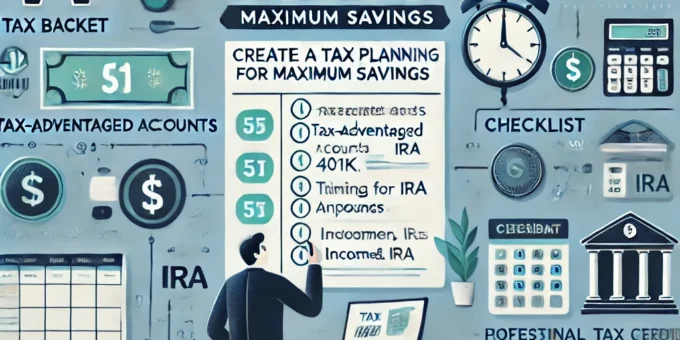
Tax planning is a crucial component of personal and business financial management. A well-structured tax planning strategy can help you minimize your tax liabilities while maximizing savings. In this article, we’ll dive into the essential elements of crafting an effective tax plan, strategies for different income levels, and tools to ensure long-term success.
What is a Tax Planning Strategy?
A tax planning strategy involves analyzing your financial situation to legally reduce your tax burden. It includes timing income, deductions, investments, and expenses to maximize tax benefits. It’s not about avoiding taxes but about making smart financial decisions.
By implementing an effective tax planning strategy, individuals and businesses can:
- Reduce tax liabilities.
- Optimize cash flow.
- Ensure compliance with tax regulations.
Why is Tax Planning Important?
Proper tax planning isn’t just for the wealthy. It benefits anyone seeking to retain more of their hard-earned money. Here’s why it matters:
- Maximized Savings: Effective tax planning ensures you take advantage of all available deductions and credits.
- Future Preparedness: Planning helps you avoid unexpected tax bills.
- Financial Efficiency: Optimizing your tax situation improves overall financial health.
Steps to Create an Effective Tax Planning Strategy
Understand Your Tax Bracket
Your tax bracket determines how much you owe the government based on your income. Analyze your current and projected earnings to evaluate potential tax obligations.
Utilize Tax-Advantaged Accounts
Investing in accounts like 401(k)s, IRAs, or HSAs can lower your taxable income. These accounts provide opportunities for tax deferrals or deductions, helping you save more for the future.
Leverage Tax Deductions and Credits
Identify and claim all deductions and credits applicable to your situation. Common deductions include:
- Mortgage interest.
- Education expenses.
- Charitable donations.
Tax credits, such as the Earned Income Tax Credit (EITC), directly reduce your tax bill and can provide substantial savings.
Consider Timing Your Income and Expenses
Shifting income or expenses between tax years can result in significant savings. For example, deferring a bonus to January instead of December might reduce your taxable income for the current year.
Diversify Investments for Tax Efficiency
Investing in tax-efficient assets, such as municipal bonds or index funds, can lower your tax burden. Understand the tax implications of capital gains and choose strategies like tax-loss harvesting to offset gains.
Hire a Professional Tax Planner
A tax professional can help identify opportunities you might miss. They bring expertise in navigating complex tax codes and provide personalized advice tailored to your financial goals.
Strategies for Maximizing Savings
Take Advantage of Retirement Accounts
Max out contributions to retirement accounts like 401(k)s and IRAs. These accounts reduce your taxable income and allow your investments to grow tax-deferred.
Home Office Deduction
If you work from home, you may be eligible for the home office deduction. Ensure your space meets IRS requirements and calculate your expenses accurately.
Self-Employment Strategies
For freelancers and small business owners, deductions for business expenses, health insurance, and contributions to SEP-IRAs or Solo 401(k)s can lead to substantial tax savings.
Common Mistakes to Avoid
Ignoring Tax Changes
Tax laws evolve, and failure to stay informed can cost you money. Regularly review updates to maximize benefits.
Missing Deadlines
Late filings or payments result in penalties and interest. Set reminders to stay on top of key tax dates.
Overlooking Documentation
Maintain organized records for income, expenses, and investments to substantiate claims during audits.
Tax Planning Strategy for Businesses
Choose the Right Business Structure
Selecting the appropriate business entity—sole proprietorship, partnership, LLC, or corporation—can affect your tax obligations.
Depreciation and Section 179 Deductions
Depreciating assets or taking advantage of Section 179 deductions for equipment purchases can significantly reduce taxable income.
Utilize R&D Credits
Businesses involved in research and development can claim R&D tax credits, reducing the cost of innovation.
FAQs
How can tax planning help me save money?
Tax planning helps identify deductions, credits, and strategies to reduce your taxable income, ultimately saving you money.
What is the difference between tax deductions and credits?
Deductions lower your taxable income, while credits reduce the tax owed directly.
Are tax-advantaged accounts really worth it?
Yes, they provide immediate tax savings and long-term benefits like retirement funding.
Can I do tax planning without a professional?
Yes, but a tax professional can identify opportunities you might miss, especially for complex financial situations.
What’s the best way to stay updated on tax laws?
Follow IRS updates, consult professionals, and use reputable financial news sources.
What records should I keep for tax planning?
Keep documentation for income, expenses, deductions, investments, and charitable contributions.
You Can Also Read : How to Protect Your Bank Account From Fraud and Scams
Conclusion
An effective tax planning strategy is essential for achieving maximum savings while ensuring compliance. Whether you’re an individual or business owner, taking proactive steps can result in significant financial benefits. By understanding tax laws, leveraging available tools, and seeking professional advice, you can create a tax strategy that aligns with your goals and secures your financial future.
